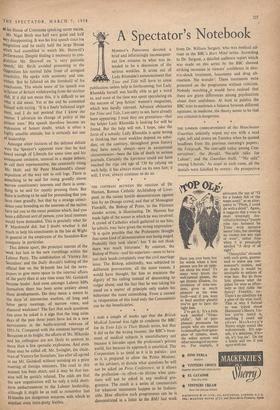I SAID a couple of weeks ago that the British
Medical Journal Was right to condemn the BBC for its Your Life in Their Hands series, but that it did so for the wrong reasons; the BBC's treat- ment of medical subjects is unsatisfactory not because it intrudes upon the profession's private world, but because its approach is uncritical. The Corporation is as timid as it is in politics : just as it is prepared to allow the Prime Minister, or his advisers, to dictate what questions he will not be asked on Press Conference, so it allows the profession—in effect—to dictate what ques- tions will not be asked in any medical pro- gramme. The result is a series of commercials for whatever treatments happen to be fashion- able. How effective such programmes can be is demonstrated in a letter to the BM., last week from Dr. William Sargant, who was medical ad- viser to the BBC's Hurt Mind series. According to Dr. Sargant, a detailed audience report which was made on this series by the BBC showed striking increases in viewers' confidence in elec- tric-shock treatment, leucotomy and drug ab- reaction. No wonder! These treatments were presented on the programme without criticism. Nobody watching "it would have realised that there are grave differences among psychiatrists about their usefulness. At least in politics the BBC tries to maintain a balance between different opinions; in medicine, the theory seems to be that any criticism is dangerous.


































 Previous page
Previous page